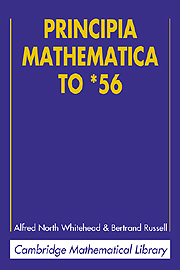Book contents
- Frontmatter
- PREFACE
- Contents
- Note
- ALPHABETICAL LIST OF PROPOSITIONS REFERRED TO BY NAMES
- INTRODUCTION TO THE SECOND EDITION
- INTRODUCTION
- CHAPTER I PRELIMINARY EXPLANATIONS OF IDEAS AND NOTATIONS
- CHAPTER II THE THEORY OF LOGICAL TYPES
- CHAPTER III INCOMPLETE SYMBOLS
- PART I MATHEMATICAL LOGIC
- Summary of Part I
- SECTION A THE THEORY OF DEDUCTION
- SECTION B THEORY OF APPARENT VARIABLES
- SECTION C CLASSES AND RELATIONS
- SECTION D LOGIC OF RELATIONS
- SECTION E PRODUCTS AND SUMS OF CLASSES
- PART II PROLEGOMENA TO CARDINAL ARITHMETIC
- APPENDIX A The Theory of Deduction for Propositions containing Apparent Variables
- APPENDIX C Truth-Functions and others
- LIST OF DEFINITIONS
SECTION A - THE THEORY OF DEDUCTION
Published online by Cambridge University Press: 25 February 2010
- Frontmatter
- PREFACE
- Contents
- Note
- ALPHABETICAL LIST OF PROPOSITIONS REFERRED TO BY NAMES
- INTRODUCTION TO THE SECOND EDITION
- INTRODUCTION
- CHAPTER I PRELIMINARY EXPLANATIONS OF IDEAS AND NOTATIONS
- CHAPTER II THE THEORY OF LOGICAL TYPES
- CHAPTER III INCOMPLETE SYMBOLS
- PART I MATHEMATICAL LOGIC
- Summary of Part I
- SECTION A THE THEORY OF DEDUCTION
- SECTION B THEORY OF APPARENT VARIABLES
- SECTION C CLASSES AND RELATIONS
- SECTION D LOGIC OF RELATIONS
- SECTION E PRODUCTS AND SUMS OF CLASSES
- PART II PROLEGOMENA TO CARDINAL ARITHMETIC
- APPENDIX A The Theory of Deduction for Propositions containing Apparent Variables
- APPENDIX C Truth-Functions and others
- LIST OF DEFINITIONS
Summary
The purpose of the present section is to set forth the first stage of the deduction of pure mathematics from its logical foundations. This first stage is necessarily concerned with deduction itself, i.e. with the principles by which conclusions are inferred from premisses. If it is our purpose to make all our assumptions explicit, and to effect the deduction of all our other propositions from these assumptions, it is obvious that the first assumptions we need are those that are required to make deduction possible. Symbolic logic is often regarded as consisting of two coordinate parts, the theory of classes and the theory of propositions. But from our point of view these two parts are not coordinate; for in the theory of classes we deduce one proposition from another by means of principles belonging to the theory of propositions, whereas in the theory of propositions we nowhere require the theory of classes. Hence, in a deductive system, the theory of propositions necessarily precedes the theory of classes.
But the subject to be treated in what follows is not quite properly described as the theory of propositions. It is in fact the theory of how one proposition can be inferred from another. Now in order that one proposition may be inferred from another, it is necessary that the two should have that relation which makes the one a consequence of the other.
- Type
- Chapter
- Information
- Principia Mathematica to *56 , pp. 90 - 126Publisher: Cambridge University PressPrint publication year: 1997



